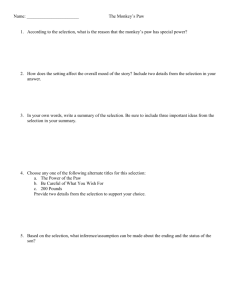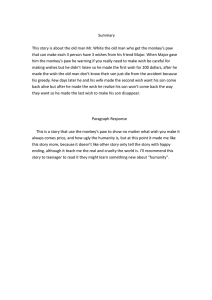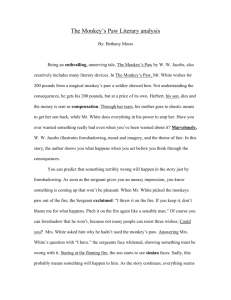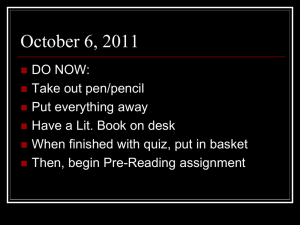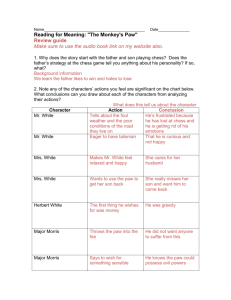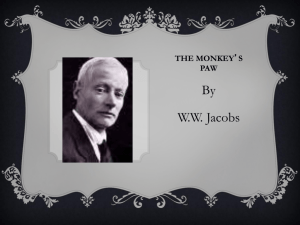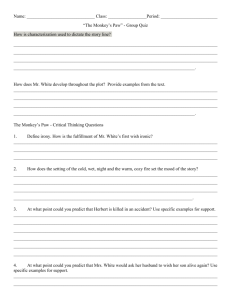Monkey's Paw (Speck)
advertisement
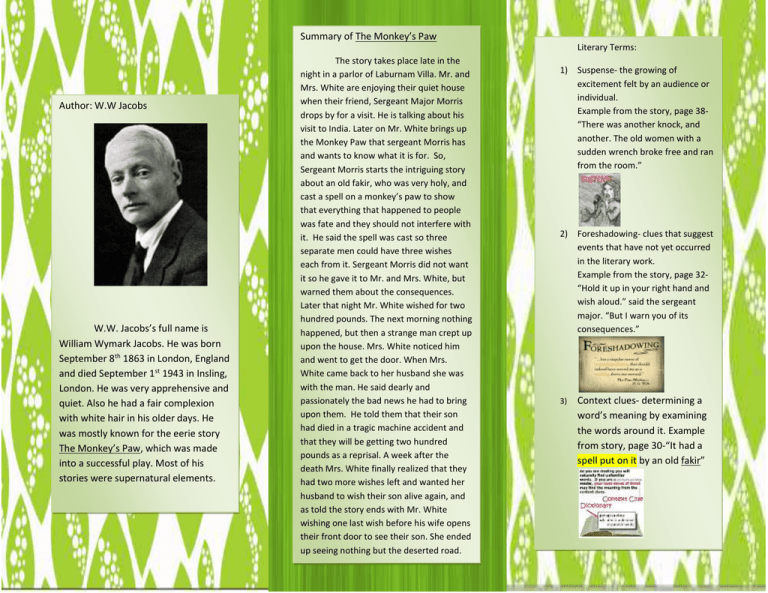
Summary of The Monkey’s Paw Literary Terms: Author: W.W Jacobs W.W. Jacobs’s full name is William Wymark Jacobs. He was born September 8th 1863 in London, England and died September 1st 1943 in Insling, London. He was very apprehensive and quiet. Also he had a fair complexion with white hair in his older days. He was mostly known for the eerie story The Monkey’s Paw, which was made into a successful play. Most of his stories were supernatural elements. The story takes place late in the night in a parlor of Laburnam Villa. Mr. and Mrs. White are enjoying their quiet house when their friend, Sergeant Major Morris drops by for a visit. He is talking about his visit to India. Later on Mr. White brings up the Monkey Paw that sergeant Morris has and wants to know what it is for. So, Sergeant Morris starts the intriguing story about an old fakir, who was very holy, and cast a spell on a monkey’s paw to show that everything that happened to people was fate and they should not interfere with it. He said the spell was cast so three separate men could have three wishes each from it. Sergeant Morris did not want it so he gave it to Mr. and Mrs. White, but warned them about the consequences. Later that night Mr. White wished for two hundred pounds. The next morning nothing happened, but then a strange man crept up upon the house. Mrs. White noticed him and went to get the door. When Mrs. White came back to her husband she was with the man. He said dearly and passionately the bad news he had to bring upon them. He told them that their son had died in a tragic machine accident and that they will be getting two hundred pounds as a reprisal. A week after the death Mrs. White finally realized that they had two more wishes left and wanted her husband to wish their son alive again, and as told the story ends with Mr. White wishing one last wish before his wife opens their front door to see their son. She ended up seeing nothing but the deserted road. 1) Suspense- the growing of excitement felt by an audience or individual. Example from the story, page 38“There was another knock, and another. The old women with a sudden wrench broke free and ran from the room.” 2) Foreshadowing- clues that suggest events that have not yet occurred in the literary work. Example from the story, page 32“Hold it up in your right hand and wish aloud.” said the sergeant major. “But I warn you of its consequences.” 3) Context clues- determining a word’s meaning by examining the words around it. Example from story, page 30-“It had a spell put on it by an old fakir” Autobiography Vocabulary Terms: 1) Doughty- Brave; valiant. Example from the story, page 30- “…scenes and doughty deeds; of wars….” Andrea Speck 2) Credulity- A tendency to believe too readily. Example from the story, page 32- “…smiling shamefacedly at his own credulity…” 3) Prosaic- commonplace; ordinary. Example from the story, page 33“There was an air of prosaic wholesomeness about the room…” - Creative Imaginative Crazy Quiet Only Child Caring The Monkey’s Paw By: W.W. Jacobs
